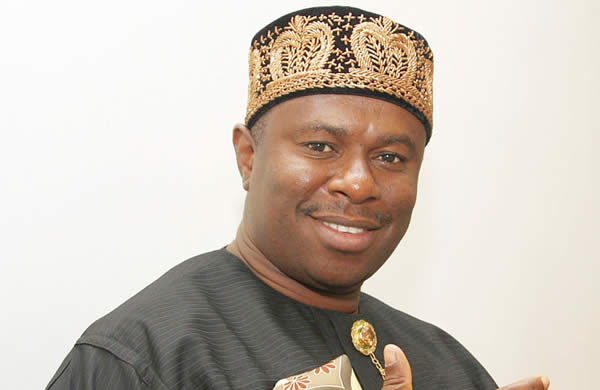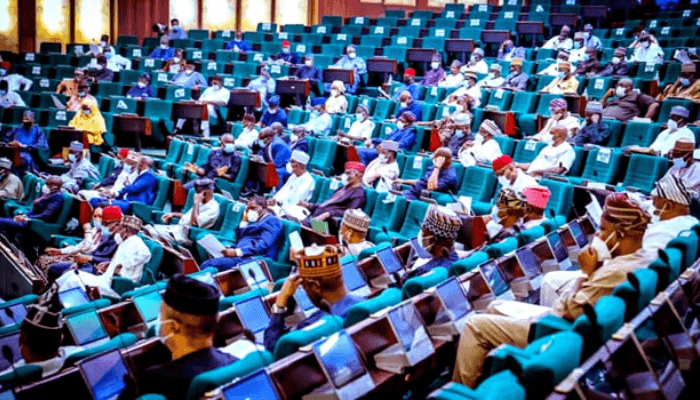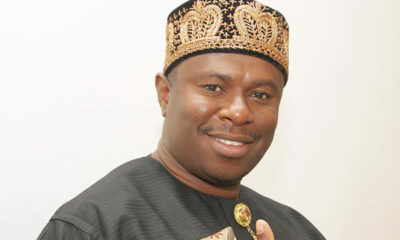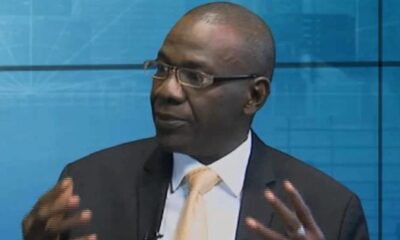News
The Naira abuse palaver

By Dakuku Peterside
There is no dispute that Naira abuse or more specifically the act of spraying money at social events has become an acceptable norm or cultural practice in Nigeria. Nigerians have a cultural affinity for lavish social gatherings. Many people regard these occasions as a means of displaying social status and wealth. Spraying Naira notes, and other currency notes, at events progressively appear to be the ultimate way to flaunt your social standing. Even burials that are supposed to be sober moments have been turned into considerable fanfare. This has created a new industry of mint note trading and events management. All of these constitute the social infrastructure of Naira abuse. A new dimension of the social infrastructure of Naira abuse is the arrival to the scene of the nouveau rich. Society has labelled them with all sorts of nomenclature: Yahoo Boys, Yahoo Plus, and 419.
Nigeria has since recognised the dangers of Naira abuse but that is not the focus of this piece. The government has made rules and laws to check it and provided enlightenment campaigns to educate people. The Central Bank of Nigeria( CBN) gave Naira abuse as one of the reasons why it is pushing for digital-based financial transactions. Naira abuse, like its ancestor-mother social epidemic of corruption, has remained stubborn and refused to go away.
There is ambiguity about what constitutes Naira abuse. The Central Bank of Nigeria Act of 2007 in Section 21 of the CBN Act 2007 clearly defines Naira abuse and prescribes various punishments to deter citizens from abusing the Naira. They include – spraying banknotes at events; writing on banknotes; stapling banknotes; tearing banknotes; dancing or stamping on Naira; defacing the bank notes with substances or ink, oil; selling currency banknotes; mutilation of the Naira note; money bouquets. However, law enforcement has been lax. It is commonly believed that the laws against Naira abuse are either symbolic or desuetude because no one is held accountable, everyone gets away with it, and things have normalised.
The social phenomena of Naira abuse, especially the spraying of money, have become an epidemic in Nigeria. Lately, it is of significant concern. We have exported this to many parts of the world, and social media is replete with evidence of this in weddings and other social events attended by Nigerians in different parts of the world.
Malcolm Gladwell’s book, “The Tipping Point: How Little Things Can Make a Big Difference” explores the idea that social phenomena, like trends and epidemics, often reach a tipping point where they suddenly become widespread. He identifies three key factors that contribute to this tipping point: the Law of the Few (the idea that a small number of people have a disproportionate influence), the Stickiness Factor (how messages or ideas stick in the minds of people), and the Power of Context (how the environment influences behaviour).
Through engaging anecdotes and research, Gladwell illustrates how understanding these factors can help individuals and organisations create or manipulate trends and epidemics. The book emphasises the importance of paying attention to small details and understanding the social dynamics behind spreading ideas and behaviours. The fundamental concepts of the book about Naira Abuse are twofold. First, the cultural context or external environment provides the soil for bad or good behaviour to grow and spread. Second, key people with remarkable personalities can cause or stop social epidemics because of their social profile or social network.
There is a link between the recommendation of Malcolm Gladwell and the arrest and prosecution of Idris Okuneye better known as Bobrisky, a cross-dresser and social influencer, for Naira abuse, and the arrest and ongoing prosecution of Cubana Chief priest Pascal Okechukwu in connection with Naira abuse. Why selectively arrest the duo when everybody is involved in some form of Naira abuse either by trampling, spraying, mutilation or rumpling? Truth is that it is nearly impossible for any law enforcement organisation to find and apprehend every perpetrator. Resources exist in limited supply. It is simple wisdom to begin with people who have disproportionate influence. This is perhaps what EFCC has done. First common ground is that both of them enjoy considerable social media influence whether for positive or negative reasons depending on your own value system. These two cases, though similar, are following different paths. Bobrisky, in court, pleaded guilty and has since been handed six months imprisonment. Cubana Chief Priest did not plead guilty, so his case will go to full trial, putting the law to the test. This court case will assist us in providing answers to some critical questions: what are the societal ramifications of Naira spraying, and how can Naira misuse be proven? Is there a need to amend the existing law and make it more relevant to the challenge? Will this fresh wave of enforcement stop the epidemic of Naira abuse ? Regardless of how the legal proceedings turn out, they have highlighted how important it is to take the triplet societal plague of poor social behaviour, Naira abuse, and their ancestor-mother corruption very seriously.
I have identified six pillars to control or stop Naira abuse: Fight corruption because it is an enabler for abuse of the Naira. The incestuous relationship between corruption, illicit financial transactions and Naira abuse is well established . Second,the government should deepen knowledge and change people’s orientation by embarking on mass enlightenment, people must understand clearly what constitutes Naira abuse and what the punishment is for such offence. Third, address cultural issues relating to Naira abuse through community engagement. People gifting money to celebrants at occasions is no crime but the manner of gifting is the issue. Fourth, government should renew the push for digital transactions. Fifth, government must strengthen the structures of law enforcement. It is not just police and EFCC matter . The judiciary must upend its knowledge on the subject matter. Sixth, government must be impartial and objectively enforce the law to change cultural norms and public behaviour that defaces the Naira. This may entail revisiting and improving the law.
CBN, Police and the EFCC should study different models of changing public behaviour in the past and draw up a model and strategy to deal with the issue of Naira abuse, especially since it has become embedded in some cultures. Good examples abound abroad and in Nigeria. The British government employed various strategies to change public behaviour regarding spitting and other personal vices. Spitting in public places was prohibited by local bylaws or municipal regulations but it is social persuasion that gave the result. These laws serve as deterrents and can result in fines or other penalties for offenders. They launched public awareness campaigns, collaborated with community stakeholders, and monitored and enforced the law. However, most of all, they leveraged social norms and peer pressure to influence behaviour and encourage individuals to conform to accepted standards of behaviour by highlighting the societal consensus against spitting and certain destructive behaviours and showcasing positive role models who embody desirable conduct. Today, the practice of spitting publicly, urinating on the road corners, and other public nuisances are controlled to the barest minimum.
In Nigeria, good examples of efforts to change public behaviour can be seen around us. Most were successful to a greater degree. The government should revisit some of these campaigns and learn from them.
A model that seems to be working in Akwa Ibom State is the State Ethical and Attitudinal Reorientation initiative. Before 1999, the Akwa Ibom people experienced a severe social epidemic, “The Pervasive and prevalent Househelp Syndrome,” which gained widespread notoriety and led to the dubbed moniker “Ekaette” for nearly every female domestic helper. The administration of Obong Attah took up the task of reorienting the Akwa Ibom people’s mindset. He established the Ethical and Attitudinal Reorientation Commission (EARCOM) in Akwa Ibom and gave them the responsibility of raising public awareness about the importance of “minoring” vices and “majoring” in moral principles.
The struggle has persisted throughout the regimes, and Pastor Umo Eno’s present administration appears to be taking it to newer, more profound heights by hiring assistants for each ward and unit and charging them to carry out the Commission’s work of value reorientation in remote areas. As bait, he is using the incentivisation and social support model, drawing on the country’s current food and hunger crisis to reach out with the message of value reorientation. Today, a negligible number of Akwa Ibom daughters are house helps , and the majority are highflyers in the professions and business.
The success story of Akwa Ibom is a model that the federal government can replicate. Changing public behaviour requires a multifaceted approach that combines legislation, education, community engagement, social support and enforcement efforts. By addressing the underlying factors contributing to undesirable behaviours and promoting positive alternatives, governments can effectively shape public attitudes and foster a more socially responsible society.
News
Tinubu targets increased gas production, unveils plants in Delta, Imo


President Bola Tinubu will commission three critical gas infrastructure projects undertaken by the Nigerian National Petroleum Company Limited and its partners.
They are the AHL Gas Processing Plant 2 in Delta State, the ANOH Gas Processing Plant, and the ANOH-OB3 CTMS Gas Pipeline Projects in Imo State. The gas projects have a combined estimated output of 1,400 million standard cubic feet per day.
Special Adviser to the President on Media and Publicity, Ajuri Ngelale, disclosed this in a statement he signed Friday titled ‘President Tinubu to commission critical gas infrastructure projects.’
“The projects support the federal government’s effort to grow value from the nation’s gas assets while eliminating gas flaring…and deepen domestic gas supply as a critical enabler for economic prosperity,” said Ngelale.
The AHL Gas Processing Plant 2 is an expansion to the Kwale Gas Processing Plant, which currently supplies about 130MMscf/d of gas to the domestic market.
The processing plant is designed to process 200MMscf/d of rich gas and deliver lean gas through the OB3 Gas Pipeline. However, the facility already injecting gas is scheduled to ramp up to 180mmscfd by the end of May.
Ngelale said this additional gas supply will “support further rapid industrialisation of Nigeria” and also “produce about 160,000 MTPA of Propane and 100,000 MTPA of Butane, which will reduce the dependency on LPG Imports.”
The AHL Gas Plant is being developed by AHL Limited, an incorporated Joint Venture owned by NNPC Limited and SEEPCO.
Meanwhile, the ANOH gas plant is an integrated 300MMscf/d capacity gas processing plant designed to process non-associated gas from the Assa North-Ohaji South field in Imo State.
The plant will produce dry gas, condensate, and LPG. The gas from the ANOH plant will significantly increase the domestic gas supply, leading to increased power generation and accelerated industrialisation.
The ANOH Gas Plant is being developed by ANOH Gas Processing Company, an incorporated Joint Venture owned by NNPC Limited and Seplat Energy Plc on a 50-50 basis.
With the facility mechanically completed in December 2023, the NNPC says it is finalising pre-commissioning activities.
Third is the ANOH-OB3 CTMS Gas Pipeline Project, which the Presidency said involves the engineering, procurement, and construction of 36”x23.3km ANOH-OB3 Project.
“The Transmission Gas Pipeline will evacuate dry gas from the Assa North-Ohaji South primary treatment facility to the OB3 Custody Transfer Metering Station for delivery into the OB3 pipeline system,” read the statement.
About 600MMscf/d is estimated to be available from two separate 2 x 300MMscf/d capacity gas processing production trains from AGPC & SPDC JV.
The 23.3km Anoh-OB3 PPL is scheduled for mechanical completion by May 15, 2024.
When commissioned, the projects will increase gas supply to the domestic market by approximately 500mmscf/d, creating a better investment climate and promoting balanced economic growth cumulatively, the Presidential Spokesman affirmed
News
House of Reps to review laws, practices restricting press freedom


The House of Representatives said on Friday that it would review the laws and practices restricting press freedom and the ability of the media to carry out its constitutional role in the country.
Rep. Akin Rotimi, Chairman, House Committee on Media and Public Affairs, said this while delivering a keynote address, to mark the 2024 World Press Freedom Day organised by the Konrad Adenauer Stiftung, Nigeria.
Rotimi said the legislature would prepare the ground for journalists to operate without any hindrance provided they adhere to the tenets of their profession.
“We will enhance good governance practices, transparency and
accountability through media chats, public hearings, town hall meetings, etc., amongst other scheduled legislative actions in Agenda 6,” he said.
The International Press Freedom Day, celebrated every May 3, is a day of reflection among media professionals and stakeholders on issues of press freedom and professional ethics.
Rotimi said that the 10th House of Representatives led by Speaker Tajudeen Abbas, had resolved to work with the media to ensure a successful running of the present government.
He said that the 1999 Constitution of the Federal Republic of Nigeria (as amended) conferred on the press a critical role as contained in Section 22 regarding obligations of the mass media.
“The role states that the press, radio, television and other agencies of the mass media shall at all times be free to uphold the fundamental objectives in this chapter and uphold the responsibility and accountability of the government to the people.
“Amongst many other challenges in the course of the discharge of this constitutional mandate, the press faces a disproportionate exposure to harm in the face of the widespread insecurity challenges in the country.
“There are also issues around the dearth of funding but I call on all stakeholders to continue with concerted efforts to address these challenges.
“There is no gainsaying that there are many miles to cover as far as media freedoms in our country is concerned but we have greatly improved from the days of military intervention in our polity (particularly, 1983 – 1998),” Rotimi added.
He urged the media to encourage introspection and self-regulation, and also look at the self-defeating ways that the press delegitimises their own struggle by not upholding ethics, and address them.
Mr Lukas Laible, Deputy Resident Representative, Konrad Adenauer Stiftung, Nigeria, said the press had become the enabler of Nigerian democracy.
“May 3 of every year is an important day for journalists as freedom of speech is the beacon of the practice.
“Without freedom of speech there won’t be freedom of press, and without freedom of the press, no society can be free.
“Journalists don’t just cover events, they are the people’s transmitter and they show capability in handling issues. They hold political leaders accountable and that is what makes democracy viable.
“Holding political leaders accountable enhances good governance. If the press fails to hold the government accountable, it will deviate from the people,” Laible said.
According to him, the press is so much trusted by the people and as such must make the people know the value of a free world.
Mrs Franca Aiyetan, Secretary, Nigerian Broadcasting Commission (NBC), who spoke during a panel session, urged journalists to always do their job in a way that would not consume the people.
Aiyetan, while speaking on the theme “Navigating the Intersection of Media Regulations, Press Freedom Advocacy and Ethical Journalism in the Face of Environmental Crises”, noted that NBC was established to have a formidable Nigerian media.
She said that NBC was not established as an attack dog for the government and as such would want the press to always work with it.
“If a detail about a truth will set two tribes against each other, then, there is something wrong with that truth.”
Another panelist, Mrs Mojirayo Ogunlana, the Executive Director, Digicivic Initiative, said journalists needed laws that should protect them while discharging their job.
“Threats to the lives of journalists should be declared as a state of emergency,” Ogunlana added.
She urged media practitioners to self-regulate themselves to prevent the government from exploiting any vacuum that could give it the opportunity to pounce on them.
News
Stop using repressive laws to intimidate journalists – SERAP, NGE tell FG


The Socio-Economic Rights and Accountability Project, SERAP, and Nigeria Guild of Editors, NGE, have called on Nigerian authorities at all levels of government to stop using repressive and anti-media laws to target, intimidate and harass journalists, critics and media houses.
The groups made the demand after an interactive session on ‘the state of press freedom in Nigeria’ held at the Radisson Blu Hotel in Ikeja.
In a joint statement, SERAP and NGE said that, “the government of President Bola Tinubu, the country’s 36 governors and FCT minister must now genuinely uphold press freedom, ensure access to information to all Nigerians, obey court judgments, and respect the rule of law”.
They expressed concerns about the escalating crackdown on the right to freedom of expression and media freedom and the flagrant disregard for the rule of law by authorities at all levels of government.
The groups note that the suppression of the press in recent times takes various forms ranging from extrajudicial to unlawful detentions, disappearances, malicious prosecutions and wrongful use of both legislation and law enforcement.
The statement read in part: “We would continue to speak truth to power and to hold authorities to account for their constitutional and international obligations including on freedom of expression and media freedom.
“Nigeria as a country has a long and unpleasant history of press gagging and clampdown on media freedom, which is evidence of extensive state censorship of media and in some cases, the utter control of state-owned media houses.
“This position has not changed considerably despite almost 25 years of unbroken democratic rule in the Fourth Republic.”
-
capital market2 years ago
Rt.briscoe, FBNH, Others halts negative performance of stock market
-
Finance3 months ago
Court orders Sen. Victor Umeh to repay N136m bank debt to AMCON
-



 Abuja Update2 months ago
Abuja Update2 months agoUNDP, FG partnership needed to achieve inclusion, equity- Minister
-
Abuja Update1 month ago
Banks drive stock market performance with N147bn gain
-



 Business2 weeks ago
Business2 weeks agoTingo Group unveils Tingo Electric, Tingo Cola drink at Lagos launch
-



 Health2 weeks ago
Health2 weeks agoCapacity training will reduce migration of health workers- NPHCDA
-
News4 months ago
Oil thieves sponsoring malicious media campaign against Navy – Spokesman
-



 Infotech1 month ago
Infotech1 month agoWorld Backup Day: NITDA urges Nigerians to ensure backup of data














